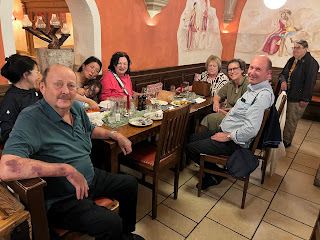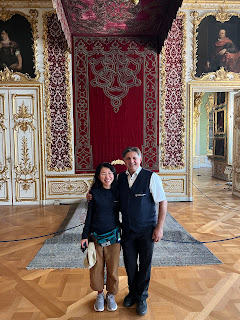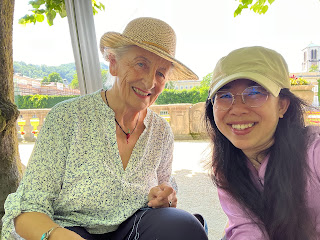An reflection on Jun 18
Having my own department—albeit one with a relatively unimportant role—has been an unexpected blessing. I don’t have to attend unnecessary faculty meetings or engage in departmental politics. It’s just me. This independence gives me space to manage my time, explore the field, and, more importantly, learn.
Being free to travel to Europe for conferences and stay on for fieldwork and teaching is a luxury—one that few scholars tethered tightly to institutions can afford. It’s not just about the funding; it’s the freedom. And I’m deeply grateful to those who’ve made it possible: the friends who offered a couch, a meal, a ticket, a quiet restroom, or just a moment of prayer. With each small act, they’ve contributed to something much larger.
My journey into public health led me to the phenomenon of hikikomori, which in turn opened doors to understand internet addiction and a host of other modern afflictions among young adults—what some might call the condition of being “unfit” for today’s world. The lack of existing data didn’t deter me. In fact, it gave me permission to enter the field boldly, to explore firsthand what others were too cautious to touch. It’s not a wise career path—not if one wishes to climb the academic ladder. But I was never climbing.
First, I am a stubborn perfectionist. I simply cannot stop until I feel I’ve arrived at an answer that sits right with me. This tendency is not unlike the traits observed in ASD: the deep immersion, the oblivion to what the world expects. But this world I’m immersed in—it’s much more interesting than the alternative.
Second, I am God-fearing and obedient—particularly when I recognize a calling higher than myself. I can tell when an idea isn’t rooted in my upbringing or ambition, but rather something planted beyond my understanding. There’s a peace, even amidst the irrationality of the path. Conversely, when I try to follow what everyone else says is wise or desirable, I feel hollow.
Mind you, I don’t enjoy being in opposition. I’m not naturally rebellious. I am, after all, an Asian woman—raised to value harmony and gentleness. Confrontation exhausts me. I am a people person. But when I must choose between peace with others and peace with God, I know which one lasts longer.
Third, and perhaps most understandably: I left a promising career in the pharmaceutical industry in my prime, to start over—from scratch. I studied social epidemiology, took unpaid roles, and followed what I believed to be a higher mission. I’ve never had a fixed career plan, and I still don’t. What I do have is faith, and a desire to see what God has prepared in the lives and struggles of the people I meet.
So why am I here in Europe, on this field trip?
As someone born in Malaysia—a former British colony—I sense strange affinities. The Alps in Switzerland reminded me of the snow-covered quiet of Akita. The French and Czech people showed a kind of conservative dignity not unlike parts of Malaysia. Even the Italian guests at our café seemed to blend the honor codes of an older Japan with the warmth of my Southeast Asian roots. These observations may sound outlandish, even amateur. Maybe they are. “Does Roseline even know what she’s talking about?” I can imagine someone scoffing. Fair.
But I’ve learned: the same action can earn applause or rebuke depending on the time, place, and people. So, I stopped trying to be universally correct. Instead, I do what I believe is right, immerse myself in it fully, and create space to share and discuss with those willing to challenge—not crush—each other. That’s where growth lives.
As a researcher in social epidemiology with no data to start with, I’ve embraced an anthropological posture. A lot of fieldwork, being with people, silent observations are indeed very much important. It had been a struggle trying to balance the organization needs, and the professional esteem. Winning a several social and academic awards led to recognition and self-esteem, yet creating tension in the department where lack of peers in the same profession had given me many nightmares for trying to defend myself and the work that I do. On June 2024, the university carved out a new department just for this work—Department of Community-Based Psychosomatic Healthcare. It is indeed a turn around. Which also means that more fieldwork should be done, as psychosomatic healthcare is so evident yet the research is so underdeveloped under mainstream medicine.
So, now. The first step is to invite peers into my ideas.
Thirteen months into this new department, we’ve already held two international seminars: a Valais-Akita educational exchange on school structure, a Padova-Akita exchange on mental health practice. Combined with conferences and invited lectures, I also had the opportunity to conduct fieldworks in Bangkok, Malaysia, Seoul and Europe. Each event was a step by step pilgrim, with one invitation led to another.
I didn’t plan my future then. I still don’t know what’s next. But I walk forward in thanksgiving, knowing I’ve been given the rare gift of working with, and learning from, the broken, the overlooked, and the hopeful. This—this strange integration of science, faith, and community—is the holy communion I’ve been invited into.
And for that, I have no words but praise.
In just twenty days, I’ve met so many amazing, generous, and lovely people that it feels as if I’ve lived several months within their communities. Every encounter brought not just kindness, but a shift in perspective—on things I thought I already understood. Ideas I’ve carried for years took on new shapes in conversations over dinner tables, on train rides, in quiet gardens, and through shared silences.
I know not everyone in my field would feel the same sense of revelation from this journey. And perhaps that’s exactly why I am so deeply grateful—for the peculiar wiring in my soul, for the way the Lord crafted my curiosity, for the genes He gave me. It’s not merit. It’s grace.
This reflection captures just the first twenty days—the opening chapter—of my time in Europe. It is only the beginning. The second part is yet to unfold, and with it, new encounters, new questions, and new learnings. Until then, I pause here, with gratitude in my heart, and a promise to write again.

































コメント
コメントを投稿